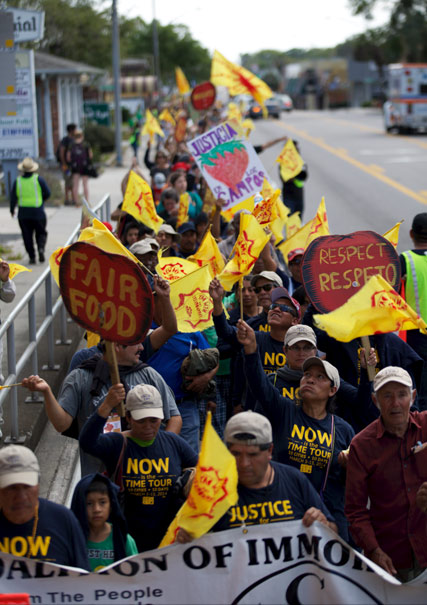
Media round-up highlights Fair Food Nation’s remarkable progress in first months of 2014…
In January, Walmart signed a Fair Food agreement, adding the world’s largest retailer to the growing list of food giants supporting the Fair Food Program.
In February, the documentary “Food Chains” premiered at the Berlin International Film Festival, introducing Europe to the Coalition of Immokalee Workers and to the two-decade long fight for Fair Food.
In March, the national Now is the Time Tour rocked ten cities in ten days, with massive actions at the top and bottom of the tour, in Dublin, Ohio, and Lakeland, Florida.
And in April, Del Monte Fresh Produce joined 90% of the Florida tomato industry in the Fair Food Program, thereby expanding the protections of the country’s most effective human rights program for farmworkers to thousands of new farm labor jobs across the state.
With the star of the Fair Food Program steadily on the rise, it is no surprise that, from time to time, we have to play catch-up just to keep up with the media coverage! So, without further ado, we present the very latest Fair Food Program media round-up:
First up, after debuting in the national industry publication The Packer, the news that Del Monte Fresh Produce joined the FFP continued to ripple through the produce industry. Here is a brief excerpt from the online forum Fresh Fruit Portal, which covered the momentous news in a remarkably detailed article titled “Del Monte deal shows fair food is good business, says Reyes”:
A subsidiary of Del Monte Fresh Produce (NYSE: FDP) recently signed up to the Coalition of Immokalee Workers (CIW) fair food program, but what does that actually mean? CIW staff member Gerardo Reyes explains a system that is protecting Florida tomato workers’ rights like never before, and which may expand into new crops and states. […]
[…] “The investment that Del Monte is bringing to the tomato industry is something that we welcome because it opens many working positions, and to look at it more deeply, it shows that companies that weren’t previously in this part of the U.S. or part of this particular industry, are betting on this system,” Reyes says.
“They’re showing their confidence that there is a future of the tomato industry in the state. They’re bringing thousands of new jobs to the state, injecting much energy into the Florida economy.
“There is clear evidence that the fair food program is not just something good for the workers, but it is good business in itself.”
In a release, Del Monte’s vice president of North American operations, Paul Rice, said the move shows its commitment improve the lives of workers in Florida fields and to the Florida tomato industry as a whole.
“We are pleased to join the Fair Food Program and continue our commitment to strong ethical sourcing standards which ensures that the products we sell are produced in a way that provides fair treatment for the workers in our supply chain,” Rice said in a release. read more
Meanwhile, the monthly journal Labor Notes published a similarly detailed look at the unique mechanisms that make the Fair Food Program tick in the profile piece, “Florida Farmworkers Score Surprise Walmart Agreement”. Although it is certainly worth checking out the article in its entirety, here are just a few highlights:
Florida Farmworkers Score Surprise Walmart Agreement
[…] Now CIW trainers educate workers about their rights, on company property and company time. Each farm has to adhere to CIW’s Fair Food Code of Conduct if it wants to sell tomatoes to the big brands that have signed on.
The program’s enforcement arm, the Fair Food Standards Council (FFSC), has eight full-time investigators, but the program doesn’t rely on them to be eyes and ears of the code, said Asbed. The goal is to make all 30,000 Florida tomato workers into monitors, watching for violations and human rights abuses. […]
[…] COMPLAINT LINE
CIW estimates that more than 14,000 workers, nearly half the tomato workers in Florida, have been through its trainings, led by farmworkers. Workers hear their rights under the Code, and learn that if they are retaliated against for speaking out, the grower can be kicked out of the program, losing important customers as a result.
All workers get a booklet in their mother tongue, listing their rights and responsibilities. There are videos for those who don’t read, with CIW members acting out scenarios. Growers must distribute the booklets along with a confidential complaint phone number, which also appears on pay stubs.
In addition to taking complaint calls, the FFSC conducts audits, interviews managers and supervisors, and talks to workers. Inspectors ride the buses, go to workers’ housing, and make announced and unannounced visits.
Workers have used the number to lodge 450 complaints since 2011 when the hotline was set up. The most frequent is supervisors requiring workers to overfill buckets, called “cupping,” which is prohibited by the Fair Food Code. Other complaints involve health and safety, retaliation, and sexual harassment… read more
Finally, the recent narrative film chronicling the life of Cesar Chavez — which also debuted alongside the documentary “Food Chains” in Berlin — has sparked a wave of conversation in the public square about farmworker organizing and Chavez’s legacy, and the new forms that legacy has taken in the world of agriculture today. ABC News covered the new film in-depth in a piece titled “50 Years Later, ‘Chavez’ Film Shows Farmworker’s Plight Remains” — and in their analysis, ABC ended on a positive note, highlighting the current-day promise of the Fair Food Program:
“Cesar Chavez represents a fight for social justice and for human dignity and he’s the epitome of the American spirit, that we have the power to create the world we want to live in,” said America Ferrera, who stars in the film.
[…] “To be a consumer is a responsibility. And we keep living as if food appears magically in the store, you know? And, we don’t ask ourselves ‘What needed to happen for this to get in front of me?'” [Diego Luna] added.
But advocates say there is something that you as a consumer can do: a campaign called the “Fair Food Program.”
Created in 2001, the program asks grocery stores and fast food restaurants to pay just one penny more per pound of Florida tomatoes. That money goes directly into the farmworkers’ pockets, making a substantial difference on farmworkers’ wages in Florida… read more
And that’s a wrap for today’s media round up. Check back soon for the rest of April’s sure-to-be-thrilling high notes, from the US premiere of “Food Chains” at the Tribeca Film Festival to the CIW’s trip to Amsterdam for the annual Ahold Shareholder meeting!


